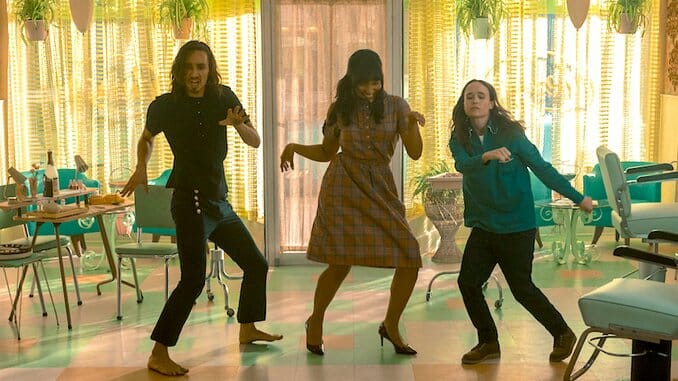A Charming Umbrella Academy Season 2 Leans Even Further into Family, Forgiveness, and Hope
Photo Courtesy of Netflix
The first season of Netflix’s The Umbrella Academy was a superhero series for those who don’t really like superhero shows, an exploration of family, failure and the pain associated with being asked to live up to a destiny you never asked for. For the seven Hargreeves children who comprise the titular team, their powers have generally been more of a curse than a blessing, and their resulting mental problems, various substance addictions, and general loneliness are proof positive of that.
Yet few moments on television last year were as weird or beautiful as watching this group of misfits find ways to forgive each other and come together again. From Klaus (Robert Sheehan) finally harnessing his power of conjuring the dead to save his family with a little help from the brother they lost when they were children, to Allison (Emmy Raver-Lampman) choosing their sister Vanya’s (Ellen Page) life in the face of her brothers’ insistence she isn’t worth saving—this is a show that contains unique, magical moments alongside murder and hand-to-hand combat (that latter often thanks to David Castañeda’s Diego).
The beauty of The Umbrella Academy is that it isn’t Watchmen. Though the two clearly share some of the same dark DNA, this series isn’t about deconstructing the tropes and problematic elements of the superhero genre. (Though, to be fair, The Umbrella Academy does poke fun at many of them.) Yes, its story has multiple apocalypses, but it also never despairs. We literally see the world burning, but things never feel truly bleak. And though this is in the strictest sense a comic book adaptation, at its heart it’s really just a story about family, forgiveness, and hope.
The Hargreeves siblings seem to spend all their time running from the end of the world, but show never treats their efforts as futile. It never gives up on them, even when it occasionally appears as if they have given up on each other. And that’s oddly more comforting than ever before now, as the show returns for Season 2 amidst a real world that feels as messy and dangerous as any paradox that Number Five’s (Aidan Gallagher) time travel could accidentally create.
In general, The Umbrella Academy’s second season sticks with what works, retreading—and sometimes even basically recreating—familiar narrative ground. There’s an argument to be made that this is the natural outcome of characters making many of the same mistakes all over again in a new time setting, and that the precise reason the series’ final few episodes are so invigorating is because the Hargreeves siblings finally start doing something different. (I’m not sure the show itself makes that argument, but it’s the one I’m going with.)
For much of the season’s first half, The Umbrella Academy spends a lot of time telling a story that feels an awful lot like something we already saw Season 1. Sent back by time traveler Number Five to try and escape the apocalypse their youngest sister caused in 2019, the Umbrella Academy is scattered across the early 1960s in Dallas, Texas, eventually finding their way back together mere days before the assassination of President John F. Kennedy—and another apocalypse that will apparently end the world.
As usual, The Umbrella Academy soars when it’s about the relationships between our multiple leads, and Season 2 is particularly good about giving us new pairings between and among the main group. Acidic Number Five makes a surprisingly good foil for Luther (Tom Hopper), and Klaus and Allison are the perfect blend of snarky and unselfconsciously supportive.
Season 2’s initial episodes are primarily concerned with bringing the Hargreeves family back together, and filling us all in on what they’ve been doing during their time stuck in the past. (Though Five has only been in 1963 for mere minutes, some characters have been there for months or even years.) There are lots of exposition-heavy flashbacks once again and, much like last season, this device works better for some characters than others.
-

-

-

-

-

-

-

-

-

-

-

-

-

-

-

-

-

-

-

-

-

-

-

-

-

-

-

-

-

-

-

-

-

-

-

-

-

-

-

-








































